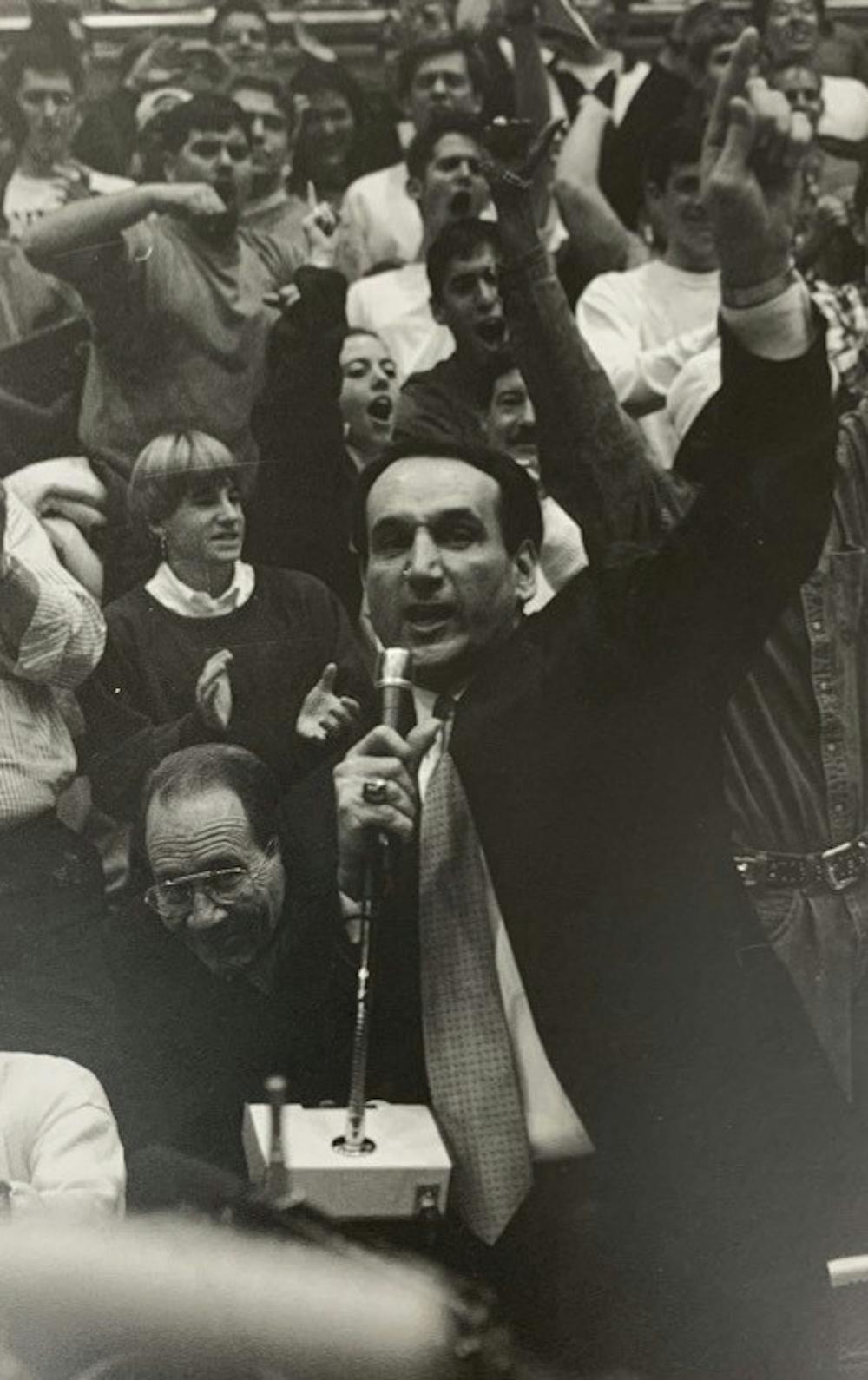It’s easy to see Coach K’s three Olympic gold medals as head of the national team, five national titles, 1,196 wins and all-star talent he’s cultivated for what they are: great. We know and remember him for his back-to-back NCAA championships in 1991 and 1992, for his assistant coaching role on the historic “Dream Team” and for his domination of the 2010s that saw Duke possess a No. 1 seed and No. 2 seed four times each in March Madness.
It’s easy to forget humble beginnings in favor of modern grandeur.
Krzyzewski’s early days were certainly humble and a far cry from the immense success he’s seen the last four decades. His upbringing in Chicago by Polish-American parents culminated in admission to Army, where he played as a point guard for four years under the tutelage of the legendary Bob Knight. His time in West Point, N.Y., wasn’t anything immensely special from a results standpoint, though he captained his senior-year team to fourth place at the 1969 NIT.
What was relatively unremarkable on the court was phenomenal in experience, though.
Knight is widely regarded as one of college basketball’s finest-ever coaches, sitting fifth in all-time wins largely thanks to an immensely successful tenure at Indiana from 1971-2000.
Knight’s teams were, more than anything, renowned for their solid fundamentals, discipline and tenacity. His offensive and mental philosophy was one Krzyzewski would replicate in the decades that followed. Look no further than Duke’s title-winning teams of 1991 and 1992; the Blue Devils were nasty to play against and their can’t-quit attitude and eagerness to scrap (looking at you, Christian Laettner) carried Krzyzewski to arguably the most dominant period in college basketball history, which consisted of three national title games, two NCAA championships and four Final Fours in as many years.
The relationship between student and mentor may have famously soured in recent years, but the influences of Krzyzewski’s former coach are clear in the identity he’s cultivated in these blue-blood Blue Devils nonetheless.
It would be a few years before Knight and Krzyzewski would reunite following the latter’s departure—this time on the sidelines—after his service in the Army. Krzyzewski spent five years in the military as a captain and was honorably discharged in 1974 when he returned to basketball as an assistant on Knight’s coaching staff at Indiana. He was only by Knight’s side for one season, one in which the Hoosiers went 31-1, but soon left for his alma mater to take over the head coach role in West Point.
His time at Army’s wheel was unremarkable when compared to the almost superhuman record he’s conducted in Durham. The Black Knights (then the Cadets) went 73-59 in his five years in charge—two of which were losing seasons—and had only a single NIT tournament berth to their name, where the team was knocked out in the opening round.
It was perhaps surprising, then, when Krzyzewski was announced as Duke’s new head coach at the start of the 1980 season. The original reaction was not one of awestruck anticipation but of cautious optimism, and his reputation far from preceded him the way it does today.
For what it’s worth, the Blue Devils had been largely hot and cold prior to Coach K’s arrival.
The program became just the eighth in NCAA history to reach 1,000 wins in 1974, slumped to a 2-10 ACC record in 1977 and rebounded for a conference title and an NCAA tournament final loss to Kentucky. Krzyzewski inherited a post fraught with the highest of highs and lowest of lows, both in recent memory, and was tasked with bringing consistency to a team that, for years, was notoriously inconsistent.
Even three years into Coach K’s tenure in Durham, that question still loomed large. The Blue Devils went a combined 38-37 in his first few seasons, possessing just one winning record and a single NIT quarterfinal appearance to their name. This led not only to uncertainty over the program’s future, but to questions about job security for the man at the helm.
"There was a lot of discontentment around the program, and it was vocal,” former player Jay Bilas said of the early Krzyzewski years in a 2015 interview with Yahoo! Sports. “Heck, there was a petition circling around calling for Mike (Krzyzewski) to be fired…there were a lot of people who were really unhappy.”
In perhaps the best decision in NCAA history, Duke withstood outside pressure to sack the young Krzyzewski. In return, it was rewarded with a 24-10 record in the 1983-84 season, including an NCAA Round of 32 appearance and a tie for third place in the ACC.
And from there, the rest is history.
Editor's note: This article is part of The Chronicle's Coach K Commemorative edition. Please click here for more content.
Get The Chronicle straight to your inbox
Signup for our weekly newsletter. Cancel at any time.

Andrew Long is a Trinity senior and recruitment/social chair of The Chronicle's 120th volume. He was previously sports editor for Volume 119.

